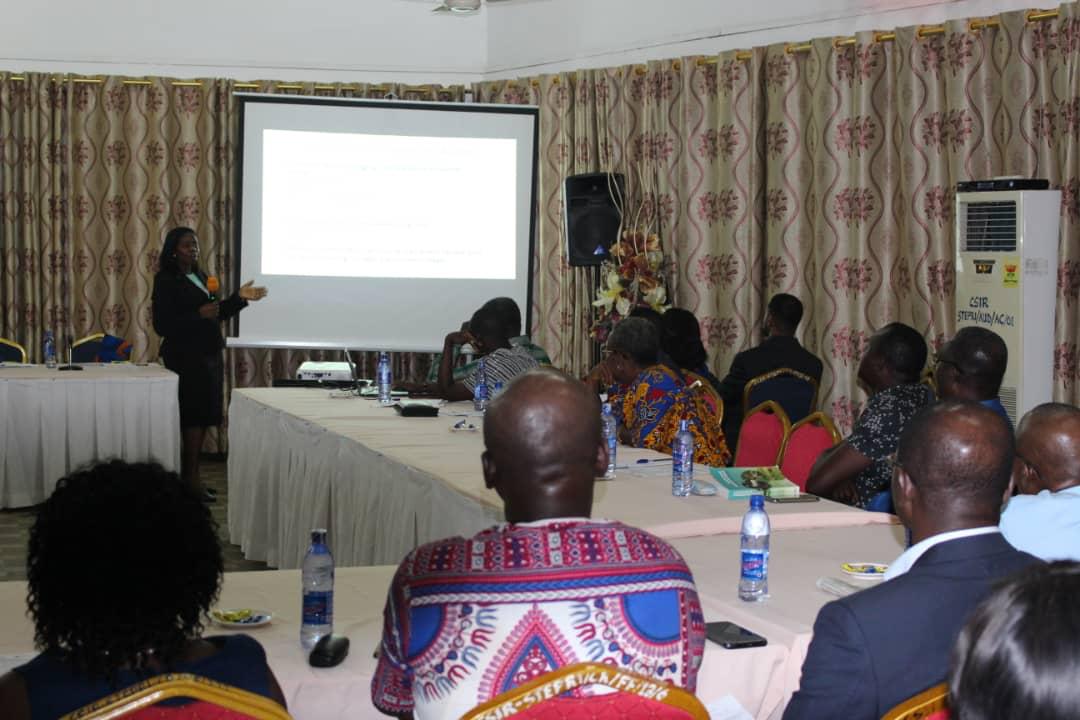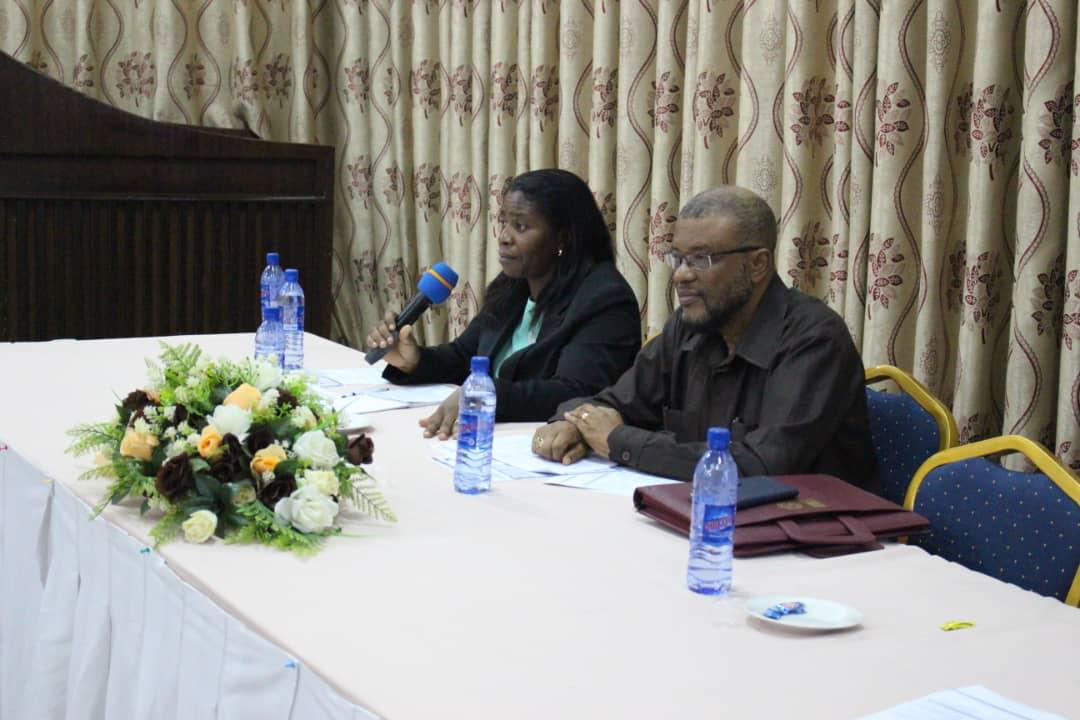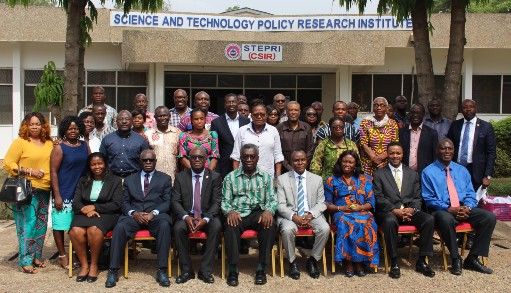


The CSIR-STEPRI on the 12th of December, 2018 hosted the Inaugural Ceremony of the National Steering Committee for Aflatoxin Control.
Background
Aflatoxins are harmful toxins produced by the fungi Aspergillus flavus and Aspergillus parasiticus. Aflatoxin contamination is widespread throughout Africa where it has been detected in grains such as maize, groundnuts, millet and sorghum as well as animal products including meat, eggs, poultry, and milk. Humans and animals are exposed to aflatoxin through consumption of contaminated foods and feed. Exposure to aflatoxins can also occur through inhalation and transmission from mother to child through the placenta and breast milk.
As of 2010, roughly 5 billion people worldwide were estimated to be exposed to high levels of aflatoxins. In most African countries, foods that are highly susceptible to aflatoxin contamination are mostly staples such as maize, groundnuts and sorghum that are frequently consumed by both humans and animals. As a result, the toxins continues to pose a significant threat to both human and animal health.
Exposure to high levels of aflatoxins results in acute health effects such as aflatoxicosis, which can cause internal bleeding and death in severe cases. In 2004, 125 people died from aflatoxicosis in Kenya, and as a result, the maize stocks, which were heavily contaminated were destroyed leading to food losses and food insecurity. Chronic exposure to low levels of aflatoxin over time can result in health problems such as suppression of the immune system, delayed recovery from kwashiorkor, stunting, impairment of liver function, and liver cancer. It is estimated that 30% of all liver cancers are caused by aflatoxins.
Aflatoxins also pose a barrier to trade due to the rejection of contaminated products by exporting countries especially the European Union. It is estimated that Africa loses up to $670 million annually due to aflatoxin contamination. In 2004, Ghana was ranked among the top ten countries with the highest number of alert notifications by the European Union’s Rapid Alert System of Food and Feed (RASFF). As a result, the European Commission carried out a mission in Ghana in 2006 to investigate the control measures Ghana has in place for aflatoxin control.
Considering the health, food security and economic implications of aflatoxins, there is an urgent need to put in place a comprehensive strategy to explicitly tackle the problem. Prioritisation of aflatoxin as a major food safety concern has already occurred at the African continental level with the establishment of the Partnership for Aflatoxin Control in Africa (PACA) by the African Union Commission during the 7th CAADP Partnership Platform meeting held in 2011. PACA is an innovative consortium for coordinating aflatoxin mitigation and management across the agriculture, health and trade sectors.
Since its establishment, PACA has held three Partnership Platform meetings. During the first and second meetings held in Addis Ababa (2014) and Entebbe (2016) respectively, country teams were tasked to facilitate the establishment of National Steering Committees for Aflatoxin Control to ensure prioritisation of aflatoxin control in national policies and programmes.
In line with these, the Science and Technology Policy Research Institute, Council for Scientific and Industrial Research (CSIR-STEPRI) with funding support from AGRA facilitated the establishment of the National Steering Committee for Aflatoxin Control, which was inaugurated on 12th December 2018.
At the Inaugural Ceremony, Prof. Victor Agyeman who was the Chairman for the event commended CSIR-STEPRI for taking steps to get the Committee established. He encouraged the Committee members to work hard to ensure a reduction in aflatoxin contamination in food. Statements were given by the Country Manager of AGRA, Mr. Foster Boateng and the Regional Agricultural Counselor of USDA, Mr. Charles Rush in which they indicated their commitment to ensuring the production and marketing of safe and quality agricultural produce for improved health and increased income in Africa.
According to the Project Coordinator, Dr. Rose Omari, the establishment of the Committee forms part of the deliverables of a project titled: “Developing National Policy and Technical Regulation for Aflatoxin Control in Food and Feed”. The project is being coordinated by the Science and Technology Policy Research Institute (CSIR-STEPRI) and funded by the Alliance for a Green Revolution in Africa (AGRA). Dr. Rose Omari indicated that expected outputs and outcomes of the projects include:
- Approved National policy with implementation plan
- Resource mobilization plan
- At least 2 proposals submitted for funding
- Technical regulation enacted
- Improved harmonization and coordination of aflatoxin-related activities among stakeholders
- Enhanced capacity of farmers and value chain actors to produce and market aflatoxin-safe food and feed
- Harmonized regulations supporting implementation of aflatoxin policy and standards
- Strengthened capacity of regulators to implement the regulations
- Increased demand for aflatoxin-safe food and feed
The National Steering Committee for Aflatoxin Control was inaugurated by the Minister for Environment, Science, Technology and Innovation (MESTI), Prof. Kwabena Frimpong-Boateng. In his keynote address, Prof Kwabena Frimpong-Boateng emphasized the detrimental effects of aflatoxins on health and noted that children are most at risk of being affected the toxins. He added that studies in humans have shown that about 30% of all liver cancer cases could be due to aflatoxin exposure. The Minister noted that although aflatoxins could have serious adverse effect on health, the economy and food security, the contamination could be prevented through the application of appropriate production and post-harvest techniques some of which are available in Ghana. According to the Hon. Minister, “aflatoxins had been with us for a long time and we could no longer afford to give these toxins a chance to destroy our food, health and sources of income.” He therefore entreated all to take seriously their membership of the Committee and work hard so that in the near future Ghana could become a nation free from the harmful effects of aflatoxins
The terms of reference for the Committee include:
- Assisting in the development of the National Policy and Technical Regulation for Aflatoxin Control (currently on-going)
- Spearheading awareness creation on aflatoxins among policy makers and relevant stakeholders
- Ensuring the implementation of the National Policy and Technical Regulation for Aflatoxin Control
- Seeking partnership with national, regional and international organisation championing aflatoxin control agenda
- Facilitating coordination of aflatoxin activities in various Ministries, Departments and Agencies
- Reviving the Innovation Platform for aflatoxin control that was established in 2015
- Mobilising resources for aflatoxin control activities
Members of the Committee were drawn from the following organizations:
- Ghana Grains Council
- Consumer Protection Agency
- Farmers Organisations Network in Ghana (FONG)
- Faculty of Public Health, Ghana College of Physicians and Surgeons
- Parliamentary Committee on Food, Agriculture and Cocoa Affairs
- Food and Drug Authority
- Science and Technology Policy Research Institute, Council for Scientific and industrial Research
- Nutrition and Food Science Department, University of Ghana
- Ghana News Agency
- Independent Expert
- EatSafe Ghana
- Ministry of Food and Agriculture
- Ministry of Environment, Science, Technology and Innovation
- Ministry of Trade and Industry
- Ministry of Finance and Economic Planning
- Ghana Standard Authority
Members of the Committee unanimously elected Prof. Richard Awuah (formerly of KNUST) as Chairman, Mrs Lysbeth Adetola of Consumer Protection Agency as Vice Chairman, Dr. Rose Omari of CSIR-STEPRI as Secretary, and Mr. Ibrahim K. Asante of CSIR-STEPRI as Vice Secretary. The Committee will be hosted by CSIR-STEPRI.
Related News
https://thepublisheronline.com/eating-food-with-moulds-can-kill-health-expert-warns/
https://agrinatura-eu.eu/2018/12/ghana-national-steering-committee-for-aflatoxin-control/
http://www.ghananewsagency.org/science/children-are-most-vulnerable-to-aflatoxin--143146
https://rainbowradioonline.com/national-steering-committee-on-aflatoxin-control-inaugurated/
http://paepard.blogspot.com/2018/12/ghana-national-steering-committee-for.html
https://web.facebook.com/gbcghana/videos/759788737709413/
https://web.facebook.com/cineplustvgh/videos/2100637466823563/

